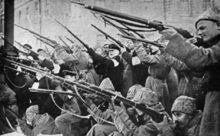February revolution
| February Revolution | |||||||
|---|---|---|---|---|---|---|---|
| Part of the Russian Revolution | |||||||
 Attacking the Tsar's police during the first days of the February Revolution |
|||||||
|
|||||||
| Belligerents | |||||||
|
Gendarmes MVD Department of Police Petrograd garrison |
Petrograd garrison (later days) |
||||||
| Commanders and leaders | |||||||
|
|
|
||||||
| Casualties and losses | |||||||
| 1,443 killed (Petrograd alone) | |||||||
Revolutionary victory
The February Revolution (Russian: Февра́льская револю́ция; IPA: [fʲɪvˈralʲskəjə rʲɪvɐˈlʲutsɨjə]), known in Soviet historiography as the February Bourgeois Democratic Revolution was the first of two Russian revolutions in 1917.
The revolution centered on Petrograd (now known as St. Petersburg), then the Russian capital, arguably beginning on 8 March (23 February in the Julian calendar). Revolutionary activity was largely confined to the capital and its vicinity, and lasted about eight days. It involved mass demonstrations and armed clashes with police and gendarmes, the last loyal forces of the Russian monarchy. On 12 March (27 February old style) mutinous Russian Army forces sided with the revolutionaries. Three days later the result was the abdication of Tsar Nicholas II, the end of the Romanov dynasty, and the end of the Russian Empire. Russian Council of Ministers was replaced by a Russian Provisional Government under Prince Georgy Lvov.
The revolution appeared to break out spontaneously, without any real leadership or formal planning. Russia had been suffering from a number of economic and social problems, which were compounded by the impact of World War I. Bread rioters primarily women in bread lines, and industrial strikers were joined on the streets by disaffected soldiers from the city's garrison. As more and more troops deserted, and with loyal troops away at the Front, the city fell into chaos, leading to the overthrow of the Tsar. In all, over 1,300 people were killed in the protests of February 1917.
...
Wikipedia
